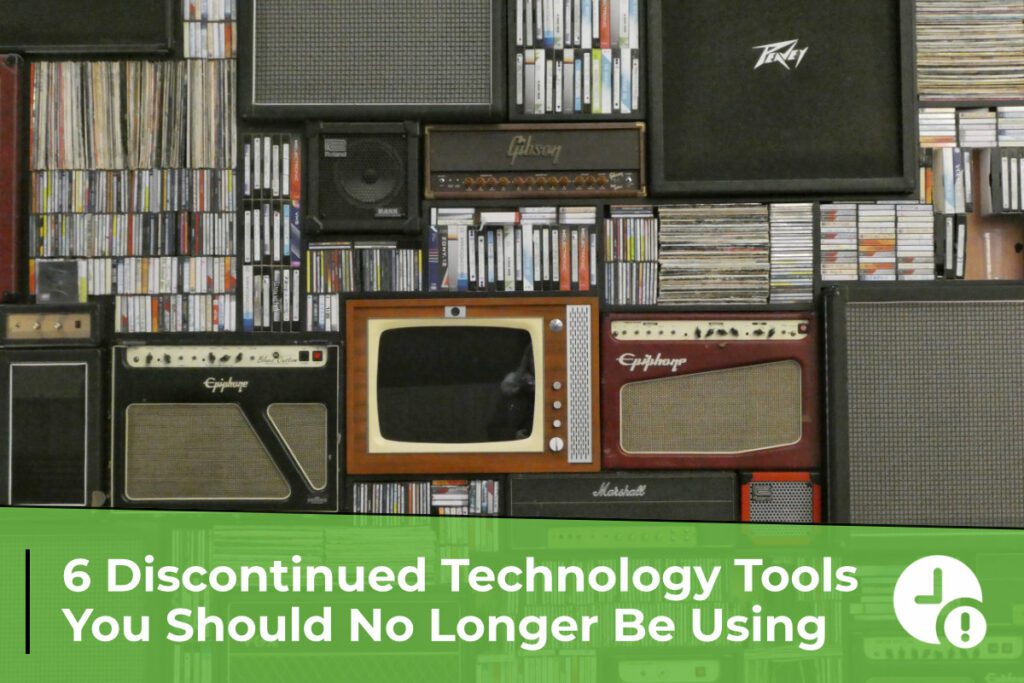There is one constant about technology: it changes rapidly. Once-standard tools, such as Internet Explorer and Adobe Flash, are becoming obsolete. Those tools that are obsolete are replaced by new ones. Discontinued technology can expose computers and networks to attacks.
Although older technology may still run fine on your system, that doesn’t mean it’s safe. Using outdated technology can lead to a data breach, which is one of the biggest dangers.
Updates for outdated hardware and software are no longer available. System updates often fix newly found and exploited vulnerabilities. Devices without security patches are vulnerable to cybersecurity breaches.
Unpatched system vulnerabilities are responsible for approximately one out of three data breaches.
Using discontinued technology can also leave you behind. As a result, your business may look like it’s stuck in the stone age to customers, and they may lose faith and trust in you.
Maintaining a supported version of your technology is important for a number of reasons:
- Reduce the risk of a data breach or malware infection
- Meet data privacy compliance requirements
- To keep a good reputation and foster customer trust
- To be competitive in your market
- To mitigate hardware and software compatibility issues
- To enable employee productivity
Employee productivity is hindered by old systems. You can lose good team members if you continue to use these older systems.
In a survey of workers, 49% said they would consider leaving their jobs if technology was not improved.
The following is a list of outdated technology tools that you should replace as soon as possible. How many of these are still in use on your home computer or within your company?
Get Rid of This Tech Now If You’re Still Using It
Internet Explorer
In the past, Internet Explorer (IE) was the world’s most popular browser. As time went on, Google Chrome and other browsers edged it out. This includes Microsoft Edge, its replacement.
With the introduction of Microsoft Edge in 2015, Microsoft began phasing out IE. The number of applications supporting use in IE has decreased in recent years. As of June 15, 2022, all support was removed from the browser.
Adobe Flash
In the early 2000s, Adobe Flash was used by millions of websites. The animations that Flash could do have been replaced by other tools. As a result, Adobe discontinued the tool.
All support for Adobe Flash Player, including security updates, ended on January 1, 2021. Is this still lingering on any of your computers? In such a case, you should uninstall the browser plugin and any Flash software.
Windows 7 and Earlier
Windows 7 was a very popular operating system, but it has now become extinct. The replacements, Windows 10 and Windows 11, are now widely used. Windows 7 OS support ended on January 14, 2020.
Although it still technically runs, it is very vulnerable to hacks. The Microsoft Windows operating system is also a high-value target for hackers. It’s safe to assume they’re looking for systems running this obsolete Windows version.
macOS 10.14 Mojave and Earlier
Apple’s iMacs and MacBooks are expensive, so people tend to hold onto them for as long as possible. Updates cease to work once these devices reach a certain point. As a result, the hardware is stuck on an older and unsupported version of macOS.
MacOS 10.14 Mojave and earlier are no longer supported by Apple, so you need to upgrade.
Oracle 18c Database
If your business relies on Oracle databases, you may want to check your version. Oracle 18C Database users are at risk. Unpatched system vulnerabilities can easily lead to breaches.
Support for Oracle 18C Database ended in June 2021. Those who have upgraded should keep an eye out for the next end-of-support date. The premier support for Oracle 19C and 21C will end in April 2024.
Microsoft SQL Server 2014
Likewise, Microsoft’s SQL is a popular database tool. However, mainstream support for SQL Server 2014 has already ended. Support for all products, including security updates, will end in July of 2024.
Therefore, you have a little more time to upgrade before you’re at risk of not getting security patches. However, it is better to upgrade sooner rather than later. The upgrade can be tested and verified during this time.
Get Help Upgrading Your Technology & Reducing Risk
Upgrades are scary, especially if everything has been going well. You may worry that a migration or upgrade will cause problems. You can rely on us to help you upgrade your technology smoothly and to conduct thorough testing afterward. Contact us today to schedule a technology review.


